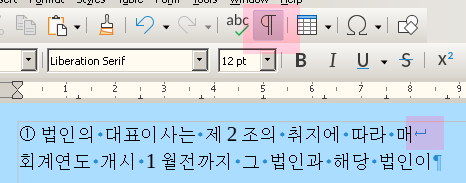I’m a Korean user, but the line keeps changing automatically when I use Korean.
For example
①법인의 대표이사는 제2조의 취지에 따라 매
회계연도 개시 1월전까지 그 법인과 해당 법인이
It’s written like this
①법인의 대표이사는 제2조의 취지에 따라 매dddddd
회계연도 개시 1월전까지 그 법인과 해당 법인이
dddddd There was a lot of space left.
①법인의 대표이사는 제2조의 취지에 따라 매 회계연
도 개시 1월전까지 그 법인과 해당 법인이
in this way 회계연
Is there a way to make it continue without changing the line automatically?



